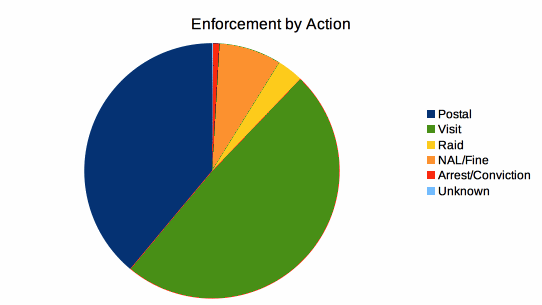I caught up on the FCC’s enforcement actions against unlicensed broadcasters this weekend. The summer’s been kind of slow for field agents, though it doesn’t mean they’re not active: enforcement activity has been reported in 17 states this year, and stations both “new” and old are getting dimed.
 As you can see from the graph at right, the majority of enforcement actions continue to be administrative: of all the enforcement activity conducted by the FCC against pirate broadcasters since 1997, fully 82% have led to nothing stronger than a visit or warning-via-certified letter.
As you can see from the graph at right, the majority of enforcement actions continue to be administrative: of all the enforcement activity conducted by the FCC against pirate broadcasters since 1997, fully 82% have led to nothing stronger than a visit or warning-via-certified letter.
This is not to mean that are aren’t some bad apples out there: one rogue (whom I did not log because the case did not involve the broadcast bands) got hit with a warning for owning a cell-phone jamming device that interfered with police communications in Miami.
On the more apropos front, an FM pirate is in hot water for interfering with at least one approach-control frequency involving “runways in the Boston, MA area.” (This is a case of spurious emission, not malice.)
Still and all, most enforcement actions begin with the traditional “we received a complaint” rationale.
The bottom line: as of now, a change of administration (and of Commissioners at the FCC) has produced no immediately discernible effects on how the agency enforces its prohibition on unlicensed broadcasting.
Skip to content